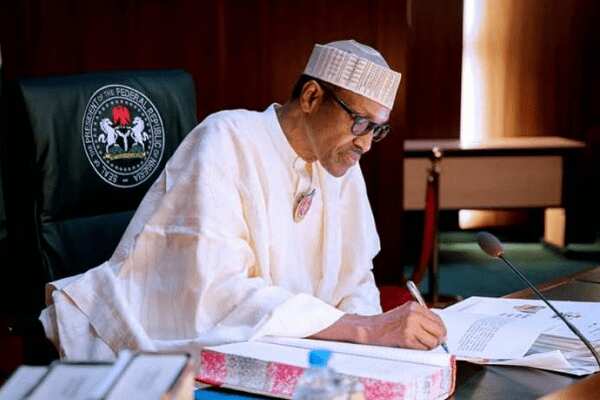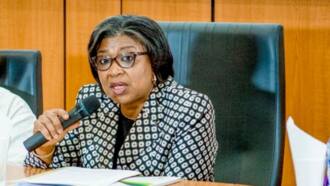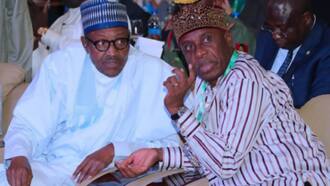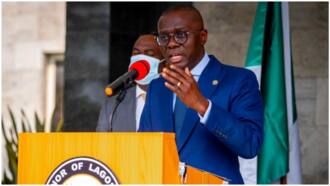N2.8trn Fresh Loan: SERAP Asks Buhari to Halt Further Borrowing to Avoid Debt Crisis
- Rights group, SERAP has asked President Muhammadu Buhari to curb his appetite for excessive borrowing to avoid a debt crisis
- SERAP said this in an open letter in which it asked the president to issue a moratorium on borrowing to forestall a looming fiscal crisis that may affect future generations
- According SERAP, placing a cap on borrowing will increase Nigeria's chances of Foreign Direct Investment and social change
A debt crisis is looming unless President Muhammadu Buhari issues a moratorium on borrowing, says the Socio-Economic Rights and Accountability Project (SERAP).
The rights group said that unless there is an immediate halt on borrowing by the president, there will be a systemic debt crisis that is disproportionately negative that could impact poor Nigerians.
A few days ago, the National Assembly approved Buhari’s request of N2.8 trillion and a grant of N4.1 billion. The last loan approvals by the legislature for loans in 2021 alone include N3.4 billion, N245 billion and N2.5 trillion.

Source: UGC
The foreign debt profile of Nigeria, including the 36 states and the Federal Capital Territory, stands at N15.7 trillion.
PAY ATTENTION: Install our latest app for Android, read best news on Nigeria’s #1 news app
SERAP disclosed this in an open letter dated December 18, 2021 and signed by Deputy Director of SERAP, Kolawole Oluwadare.
The letter said if Buhari would issue a moratorium, it would create a temporary debt standstill and free up space for investment in Nigeria as well as ensure sustainable economic and social recovery from the COVID-19 pandemic.
SERAP said:
“Without a moratorium on borrowing, your government and many of the 36 states may be caught in a process-driven mostly by creditors’ needs. This will result in an exorbitant social cost for the marginalized and vulnerable sectors of the population.”
The group also noted that long-term unsustainable debt can be a hindrance to the government’s ability to galvanise resources for human rights, and this may lead to taxes and user fees that impact negatively on vulnerable and marginalised Nigerians.

Read also
Nigerian government seeks N250bn from citizens this December for road projects, full repayment in 10 years
What SERAP said in the letter
The group added:
“SERAP is concerned about the lack of transparency and accountability in the spending of the loans so far obtained, and opacity around the terms and conditions, including repayment details of these loans.
“While the National Assembly has asked for these details in future loan requests, it ought to have seen and assessed the terms and conditions of these loans before approving them, in line with its oversight responsibility under the Nigerian Constitution of 1999 [as amended].
“If not urgently addressed, the escalating borrowing and looming debt crisis would cripple the ability of both the Federal Government and the 36 states to deliver essential public services such as quality healthcare, education, and clean water to the most vulnerable and marginalised sectors of the population."
The Bottomline
Nigeria’s debt profile has skyrocketed the highest under President Muhammadu Buhari’s administration when compared to the previous governments since 1999.
Debt servicing is reported to consume about 97 per cent of the Federal Government’s total revenue in 2020. Budgit, in its July report, said that of the N3.42 trillion generated as revenue, Nigeria spent N3.34 trillion on debt servicing. Also, N3.3 trillion was set aside for debt servicing in the assented 2021 budget.
More debts in 7 years
In a previous report, rights activist, Chidi Odinkalu, has said Nigeria’s debt profile has increased three times in the last seven years, that is since Muhammadu Buhari mounted the saddle as Nigeria’s president.
Odinkalu said this in a tweet but did not expatiate as he only provided an undated chat from the Nigeria Bureau of Statistics (NBS).
The activist may not be an economist but available data from Debt Management Office (DMO) says Nigeria’s debt profile has soared to about N35.65 trillion recently because of increased borrowing by Buhari's government. Read more:
Source: Legit.ng



